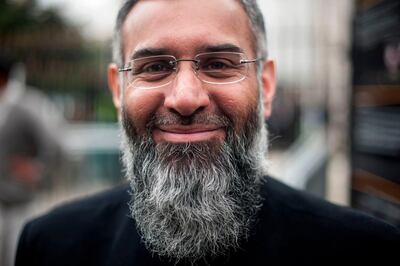British radical preacher Anjem Choudary, who was jailed for encouraging support for ISIS, has been banned by major social media platforms just weeks after the UK lifted restrictions on him speaking in public.
Choudary, 54, was released early from a five-and-a-half-year sentence from HMP Belmarsh in 2018 imposed after he used online lectures and messages to encourage support of ISIS.
He had been subjected to more than 20 conditions, which included a ban on public speaking, restricted internet and mobile phone use and a ban on contacting suspected extremists.
Just weeks after the restrictions were lifted he has now been banned by multiple online platforms, including Facebook, Twitter and Instagram, and this week LinkedIn removed his profile.
The bans were revealed by Choudary in a WhatsApp group chat.
"Most of you will have heard by now that my Twitter, Facebook and Instagram accounts were closed rapidly in the last week or so," he wrote.
"Some of you will also be aware that this is not necessarily because of anything that I said on these forums but rather because of a preset agenda that these companies pursue, part of which is to promote their own specific brand of so called freedom, liberty and democratic values."
He went on to criticise the media companies for "policing free speech".

Choudary led the Al Muhajiroun (ALM) network, which has inspired terrorists including Usman Khan, who killed two people on London Bridge in 2019. Khan was on licence after being released early from a terrorism sentence for plotting to bomb the London Stock Exchange.
Other former ALM members included the leader of three attackers who killed eight people at London Bridge in 2017, and Khalid Masood, who murdered five people on Westminster Bridge that year.
The group’s influence is said to extend far beyond Britain. Those connected to it include Abu Hamza Al Masri, jailed for life in the US in 2015 for terrorism-related offences.
Members of his banned Al Muhajiroun group have been linked to terrorist attacks internationally and a quarter of jailed terrorists in the UK were also associated with it.
Michael Zehaf-Bibeau, who shot and killed a soldier in Canada’s capital, Ottawa, in 2014, followed Choudary on Twitter.
Choudary’s influence in Europe was such that the Dutch intelligence agency Avid accused him of being a prominent ISIS influencer in the Netherlands.
In Belgium, he helped to set up Sharia4Belgium and praised its leader after more than 40 of its members were convicted of terrorism.
Campaign group Hope Not Hate said the networks Choudary created “became the largest recruiter for ISIS in Europe”.
Previously, he praised those responsible for the September 11 attacks and said he wanted to convert Buckingham Palace into a mosque.
Choudary’s restrictions expired when his sentence ended, but the intelligence services can apply to impose Terrorism Prevention and Investigation Measures on him.
The monitoring tool is used by the police against people suspected to be involved in terrorism or to present a threat, but who cannot be prosecuted or deported.
A LinkedIn spokesperson said it took the move against Choudary as it does not allow terrorist organisations.
"Our policies are clear - we don’t allow any terrorist organisations or violent extremist groups on our platform and we don’t allow any individuals who affiliate with such organisations or groups to promote their activities," it said.
"We enforce those rules to help keep LinkedIn safe, trusted and professional. These rules apply to everyone on LinkedIn and if they are violated, we take action."


